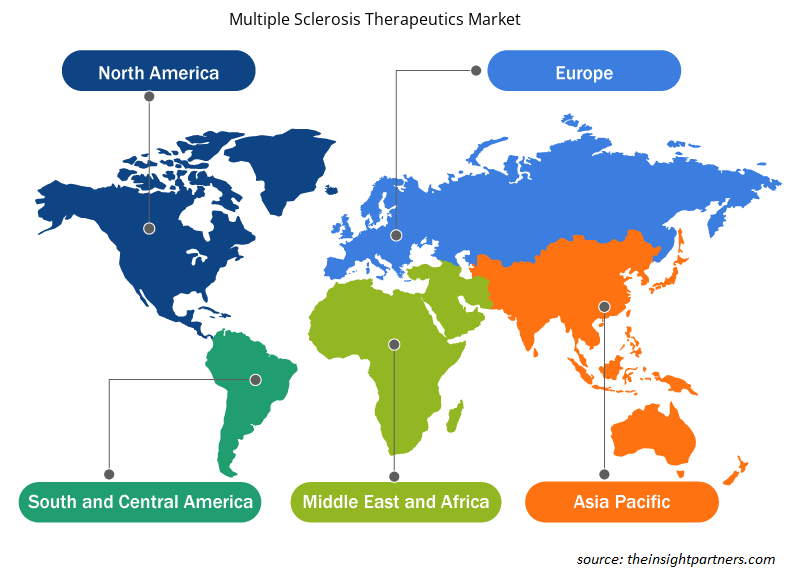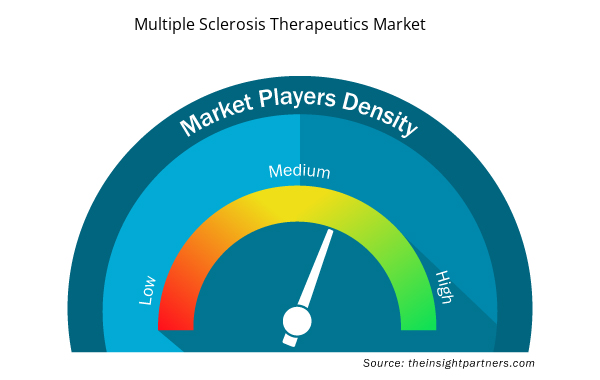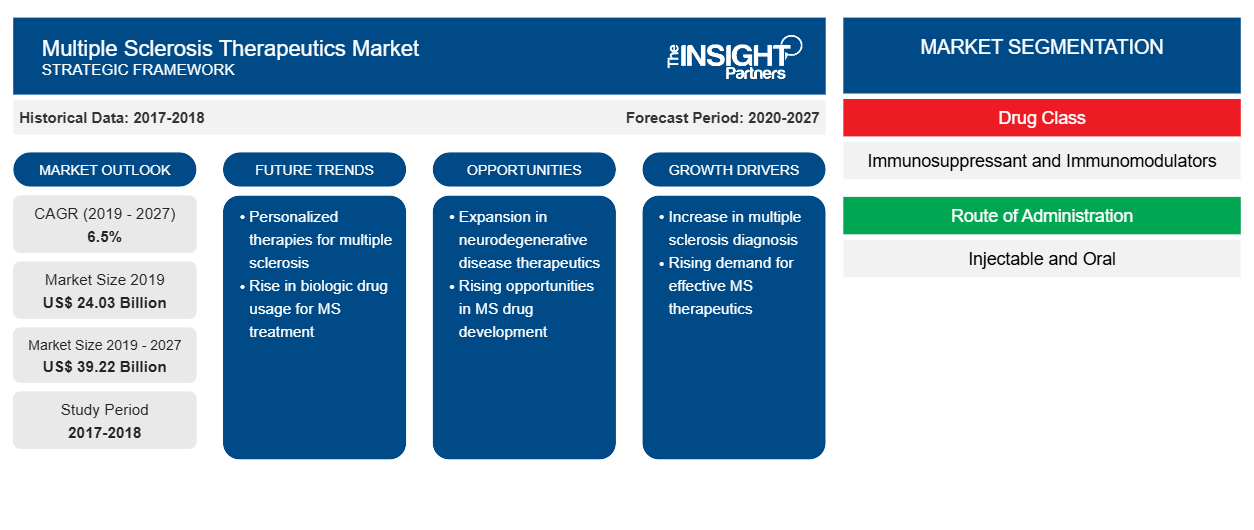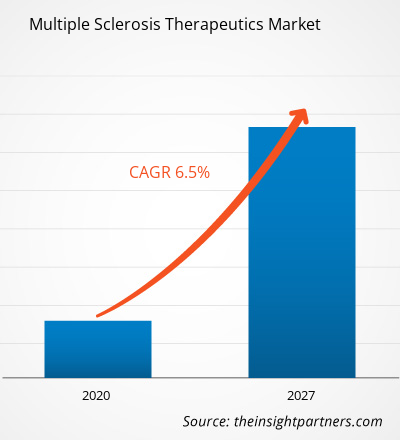多発性硬化症治療薬市場は2019年に240億2,690万米ドルと評価され、2027年までに392億2,359万米ドルに達すると予測されており、 2020年から2027年にかけて6.5%のCAGRで成長すると予想されています。
多発性硬化症 (MS) は、中枢神経系に影響を及ぼす自己免疫疾患です。免疫系が神経を攻撃し、脳と体の他の部分との間のコミュニケーションに問題が生じます。免疫抑制剤と免疫調節剤、および理学療法は、MS の治療に広く使用されています。Immunosuppressant and immunomodulators, along with physiotherapy, are widely used to treat MS.
多発性硬化症治療薬市場の範囲には、薬物クラス、投与経路、流通チャネル、地域が含まれます。多発性硬化症治療薬市場は、北米、ヨーロッパ、アジア太平洋、中東およびアフリカ、南米および中米などの地域に基づいて分析されます。このレポートでは、市場動向、技術の進歩、市場動向、世界中の主要な市場プレーヤーの競争環境分析など、さまざまなパラメーターに重点を置いて、多発性硬化症治療薬市場の洞察と詳細な分析を提供します。
要件に合わせてレポートをカスタマイズする
このレポートの一部、国レベルの分析、Excelデータパックなど、あらゆるレポートを無料でカスタマイズできます。また、スタートアップや大学向けのお得なオファーや割引もご利用いただけます。
- このレポートの主要な市場動向を入手してください。この無料サンプルには、市場動向から見積もりや予測に至るまでのデータ分析が含まれます。
市場分析
多発性硬化症の罹患率増加
多発性硬化症は、脳、脊髄、視神経に影響を及ぼす慢性疾患です。多発性硬化症の症状には、衰弱、不安、味覚異常、感覚低下、かすみ目または視力喪失などがあります。その他の兆候としては、便秘、筋肉の硬直、うつ病、思考障害、排尿障害などがあります。
研究によると、世界中で多発性硬化症の罹患率が増加しています。たとえば、全米多発性硬化症協会の 2017 年の調査によると、米国では約 100 万人の成人 (最大 913,925 人) が MS を患っています。2010 年の推定罹患率は 10 万人あたり 309 件で、MS を患っている成人は 727,344 人でした。さらに、カナダ政府によると (2014 ~ 2015 年の推定)、77,000 人を超えるカナダ人が多発性硬化症を患っており、そのうち 4 分の 3 が女性です。
さらに、多発性硬化症協会は、2018年に英国で約11万人がこの病気に苦しんでいると推定しました。また、MSは女性の罹患率が男性の2倍以上であるとも述べています。年間の新規患者診断数も増加しており、2017年の5,000人から2018年には6,700人に増加しました。
したがって、多発性硬化症の罹患率の増加が多発性硬化症治療薬市場を牽引しています。
薬物クラスに基づく洞察
多発性硬化症治療薬の薬物クラスに基づいて、多発性硬化症治療薬市場は免疫抑制剤と免疫調節剤に分類されます。2019 年には、免疫調節剤セグメントが市場の大きなシェアを占めました。このセグメントの成長は、新しいジェネリック医薬品の発売と、MS 治療における免疫調節剤の採用の増加に起因しています。免疫抑制剤セグメントは、予測期間中に高い CAGR を記録する可能性があります。
投与経路に基づく洞察
投与経路の面では、多発性硬化症治療薬市場は注射剤と経口剤に分かれています。注射剤セグメントは2019年に市場で大きなシェアを占め、予測期間中に同じセグメントがより高いCAGRを記録すると予想されています。
流通チャネルに基づく洞察
流通チャネルに基づいて、多発性硬化症治療薬市場は、病院薬局、小売薬局、電子商取引に分類されます。病院薬局セグメントは2019年に市場で最大のシェアを占め、電子商取引セグメントは予測期間中に市場で最も高いCAGRを記録すると予想されます。
COVID-19パンデミックは、世界中で最も重大な課題となっています。この課題は、世界貿易の混乱による輸入の減少につながるため、特に世界中の発展途上国にとって恐ろしいものとなるでしょう。現在まで、COVID-19に対する決定的な治療法は確立されていません。神経疾患などの重篤な健康状態の患者は、そのような慢性疾患の治療の遅れを目の当たりにしています。このパンデミック状況に関連するサプライチェーンの混乱は、最終的に短期的に製品の販売に影響を与えるでしょう。しかし、ロックダウン中に薬局が営業を許可されているため、MS薬の供給はパンデミック中でも継続しています。いくつかの企業は、COVID-19パンデミックに対応して臨床試験活動を削減し、製品の発売を遅らせています。たとえば、ブリストル・マイヤーズスクイブは、COVID-19パンデミックの発生により、多発性硬化症薬ゼポシア(オザニモド)の発売を延期しました。
企業が世界規模で事業を拡大し、高まる需要に対応するために、製品の発売と拡大戦略を採用することが一般的です。これらの戦略は、製品ポートフォリオを拡大するために市場プレーヤーによって一般的に採用されています。
多発性硬化症治療薬市場で活動する市場プレーヤーは、世界中の変化する顧客の需要に応えるために製品イノベーション戦略を採用しており、これによりプレーヤーは世界的にブランド名を維持することも可能になっています。
多発性硬化症治療薬市場の地域別分析
予測期間を通じて多発性硬化症治療薬市場に影響を与える地域的な傾向と要因は、Insight Partners のアナリストによって徹底的に説明されています。このセクションでは、北米、ヨーロッパ、アジア太平洋、中東およびアフリカ、南米および中米にわたる多発性硬化症治療薬市場のセグメントと地理についても説明します。

- 多発性硬化症治療薬市場の地域別データを入手
多発性硬化症治療薬市場レポートの範囲
| レポート属性 | 詳細 |
|---|---|
| 2019年の市場規模 | 240.3億米ドル |
| 2027年までの市場規模 | 392.2億米ドル |
| 世界のCAGR(2019年 - 2027年) | 6.5% |
| 履歴データ | 2017-2018 |
| 予測期間 | 2020-2027 |
| 対象セグメント | 薬物クラス別
|
| 対象地域と国 | 北米
|
| 市場リーダーと主要企業プロフィール |
|
多発性硬化症治療薬市場のプレーヤー密度:ビジネスダイナミクスへの影響を理解する
多発性硬化症治療薬市場は、消費者の嗜好の変化、技術の進歩、製品の利点に対する認識の高まりなどの要因により、エンドユーザーの需要が高まり、急速に成長しています。需要が高まるにつれて、企業は提供を拡大し、消費者のニーズを満たすために革新し、新たなトレンドを活用し、市場の成長をさらに促進しています。
市場プレーヤー密度とは、特定の市場または業界内で活動している企業または会社の分布を指します。これは、特定の市場スペースに、その市場規模または総市場価値に対してどれだけの競合相手 (市場プレーヤー) が存在するかを示します。
多発性硬化症治療薬市場で事業を展開している主要企業は次のとおりです。
- メルク社
- ノバルティスAG
- バイエルAG
- サノフィ
- ブリストル・マイヤーズ スクイブ社
免責事項:上記の企業は、特定の順序でランク付けされていません。

- 多発性硬化症治療薬市場のトップキープレーヤーの概要を入手
薬物クラス別
- 免疫抑制剤
- 免疫調節薬
投与経路別
- 注射可能
- オーラル
流通チャネル別
- 病院薬局
- 小売薬局
- 電子商取引
地理別
- 北米
- 私たち
- カナダ
- メキシコ
- ヨーロッパ
- フランス
- ドイツ
- イタリア
- 英国
- スペイン
- その他のヨーロッパ
- アジア太平洋(APAC)
- 中国
- インド
- 韓国
- 日本
- オーストラリア
- その他のアジア太平洋地域
- 中東・アフリカ(MEA)
- 南アフリカ
- サウジアラビア
- アラブ首長国連邦
- その他の中東およびアフリカ
- 南アメリカ(SAM)
- ブラジル
- アルゼンチン
- 南米のその他の地域
企業プロフィール
- メルク社
- ノバルティスAG
- バイエルAG
- サノフィ
- ブリストル・マイヤーズスクイブ社
- ホライゾン・セラピューティクス
- テバ製薬工業株式会社
- 武田薬品工業株式会社
- F. ホフマン・ラ・ロッシュ株式会社
- バイオジェン
- 過去2年間の分析、基準年、CAGRによる予測(7年間)
- PEST分析とSWOT分析
- 市場規模価値/数量 - 世界、地域、国
- 業界と競争環境
- Excel データセット


- Dealer Management System Market
- Pressure Vessel Composite Materials Market
- Drain Cleaning Equipment Market
- Asset Integrity Management Market
- Clinical Trial Supplies Market
- Smart Parking Market
- Dried Blueberry Market
- Collagen Peptides Market
- Integrated Platform Management System Market
- Print Management Software Market

Report Coverage
Revenue forecast, Company Analysis, Industry landscape, Growth factors, and Trends

Segment Covered
This text is related
to segments covered.

Regional Scope
North America, Europe, Asia Pacific, Middle East & Africa, South & Central America

Country Scope
This text is related
to country scope.
Trends and growth analysis reports related to Life Sciences : READ MORE..
The List of Companies - Multiple Sclerosis Therapeutics Market
- Merck & Co., Inc.
- Novartis AG
- Bayer AG
- Sanofi
- Bristol-Myers Squibb Company
- Horizon Therapeutics plc.
- TEVA PHARMACEUTICAL INDUSTRIES LTD
- Takeda Pharmaceutical Company Limited
- F. HOFFMANN-LA ROCHE LTD.
- Biogen
The Insight Partners performs research in 4 major stages: Data Collection & Secondary Research, Primary Research, Data Analysis and Data Triangulation & Final Review.
- Data Collection and Secondary Research:
As a market research and consulting firm operating from a decade, we have published and advised several client across the globe. First step for any study will start with an assessment of currently available data and insights from existing reports. Further, historical and current market information is collected from Investor Presentations, Annual Reports, SEC Filings, etc., and other information related to company’s performance and market positioning are gathered from Paid Databases (Factiva, Hoovers, and Reuters) and various other publications available in public domain.
Several associations trade associates, technical forums, institutes, societies and organization are accessed to gain technical as well as market related insights through their publications such as research papers, blogs and press releases related to the studies are referred to get cues about the market. Further, white papers, journals, magazines, and other news articles published in last 3 years are scrutinized and analyzed to understand the current market trends.
- Primary Research:
The primarily interview analysis comprise of data obtained from industry participants interview and answers to survey questions gathered by in-house primary team.
For primary research, interviews are conducted with industry experts/CEOs/Marketing Managers/VPs/Subject Matter Experts from both demand and supply side to get a 360-degree view of the market. The primary team conducts several interviews based on the complexity of the markets to understand the various market trends and dynamics which makes research more credible and precise.
A typical research interview fulfils the following functions:
- Provides first-hand information on the market size, market trends, growth trends, competitive landscape, and outlook
- Validates and strengthens in-house secondary research findings
- Develops the analysis team’s expertise and market understanding
Primary research involves email interactions and telephone interviews for each market, category, segment, and sub-segment across geographies. The participants who typically take part in such a process include, but are not limited to:
- Industry participants: VPs, business development managers, market intelligence managers and national sales managers
- Outside experts: Valuation experts, research analysts and key opinion leaders specializing in the electronics and semiconductor industry.
Below is the breakup of our primary respondents by company, designation, and region:

Once we receive the confirmation from primary research sources or primary respondents, we finalize the base year market estimation and forecast the data as per the macroeconomic and microeconomic factors assessed during data collection.
- Data Analysis:
Once data is validated through both secondary as well as primary respondents, we finalize the market estimations by hypothesis formulation and factor analysis at regional and country level.
- Macro-Economic Factor Analysis:
We analyse macroeconomic indicators such the gross domestic product (GDP), increase in the demand for goods and services across industries, technological advancement, regional economic growth, governmental policies, the influence of COVID-19, PEST analysis, and other aspects. This analysis aids in setting benchmarks for various nations/regions and approximating market splits. Additionally, the general trend of the aforementioned components aid in determining the market's development possibilities.
- Country Level Data:
Various factors that are especially aligned to the country are taken into account to determine the market size for a certain area and country, including the presence of vendors, such as headquarters and offices, the country's GDP, demand patterns, and industry growth. To comprehend the market dynamics for the nation, a number of growth variables, inhibitors, application areas, and current market trends are researched. The aforementioned elements aid in determining the country's overall market's growth potential.
- Company Profile:
The “Table of Contents” is formulated by listing and analyzing more than 25 - 30 companies operating in the market ecosystem across geographies. However, we profile only 10 companies as a standard practice in our syndicate reports. These 10 companies comprise leading, emerging, and regional players. Nonetheless, our analysis is not restricted to the 10 listed companies, we also analyze other companies present in the market to develop a holistic view and understand the prevailing trends. The “Company Profiles” section in the report covers key facts, business description, products & services, financial information, SWOT analysis, and key developments. The financial information presented is extracted from the annual reports and official documents of the publicly listed companies. Upon collecting the information for the sections of respective companies, we verify them via various primary sources and then compile the data in respective company profiles. The company level information helps us in deriving the base number as well as in forecasting the market size.
- Developing Base Number:
Aggregation of sales statistics (2020-2022) and macro-economic factor, and other secondary and primary research insights are utilized to arrive at base number and related market shares for 2022. The data gaps are identified in this step and relevant market data is analyzed, collected from paid primary interviews or databases. On finalizing the base year market size, forecasts are developed on the basis of macro-economic, industry and market growth factors and company level analysis.
- Data Triangulation and Final Review:
The market findings and base year market size calculations are validated from supply as well as demand side. Demand side validations are based on macro-economic factor analysis and benchmarks for respective regions and countries. In case of supply side validations, revenues of major companies are estimated (in case not available) based on industry benchmark, approximate number of employees, product portfolio, and primary interviews revenues are gathered. Further revenue from target product/service segment is assessed to avoid overshooting of market statistics. In case of heavy deviations between supply and demand side values, all thes steps are repeated to achieve synchronization.
We follow an iterative model, wherein we share our research findings with Subject Matter Experts (SME’s) and Key Opinion Leaders (KOLs) until consensus view of the market is not formulated – this model negates any drastic deviation in the opinions of experts. Only validated and universally acceptable research findings are quoted in our reports.
We have important check points that we use to validate our research findings – which we call – data triangulation, where we validate the information, we generate from secondary sources with primary interviews and then we re-validate with our internal data bases and Subject matter experts. This comprehensive model enables us to deliver high quality, reliable data in shortest possible time.


 このレポートの無料サンプルを入手する
このレポートの無料サンプルを入手する